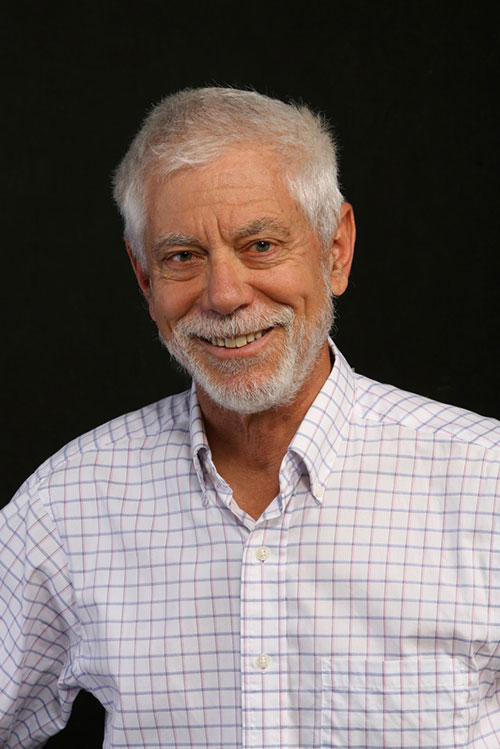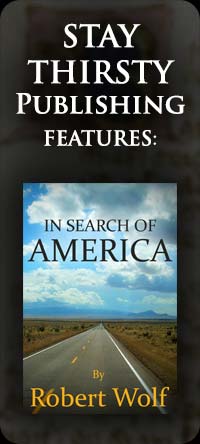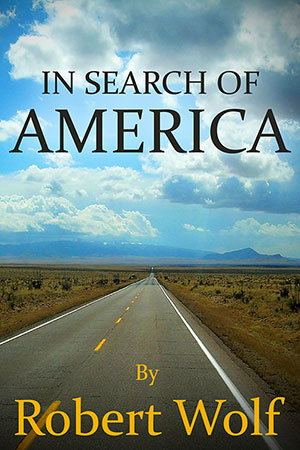

A Conversation with Author Robert Wolf
By THIRSTY
Robert Wolf has seen America in ways that few people have. "Wolf's approach to oral history is unique . . . His work is more than a lament, it is a battle cry," remarked literary lion and Pulitzer Prize-winner Studs Terkel. From one end of the U.S. to the other, Robert Wolf has lived and listened to what Americans had to say, chronicled how they spent their days and observed what it meant to be an American. His long and storied career as an author, playwright, newspaperman, radio talk show host, publisher and teacher resonates with the stories of ordinary people, and his recently published book, In Search of America, carries on a literary wanderlust tradition made famous by Jack Kerouac in the late 1950s. Stay Thirsty Magazine was privileged to visit with Robert Wolf at his home in Decorah, Iowa for this Conversation to learn more about his life, his adventures and his love of America.
STAY THIRSTY: Your new book, In Search of America, is subtitled "A Young Man's Quest for Meaning," and recounts your travels and adventures beginning in the early 1960s when you were in your late teens and early twenties. What was it about that era that brought out the wanderlust in young men and especially in you?
ROBERT WOLF: The early 1960s, when I first went on the road, was a period of conformity in America. Many people my age wanted nothing to do with what their parents had worked hard to achieve. We didn't want the house in the suburbs, we didn't want to live up to bourgeois expectations, we didn't care for respectability, we didn't want to keep up with the Joneses. We wanted more out of life.
For many of us—certainly for me—the bourgeois life was stultifying. It was programmed. Adults wanted to fit in and be accepted by others in their social group. They needed to have their children fit in and be accepted too. I was told repeatedly by my parents to smile so that people would like me better.
I felt, and my friends felt, that many of the adults we knew were playing roles—were simply inauthentic. We knew that even before J.D. Salinger made it public with The Catcher in the Rye. The fact that Salinger's book was such a huge success among teens showed that Salinger not only expressed what he had felt, but expressed what many of my generation felt.
Living with all this—the conformity and the role-playing—I needed to experience ways of life that were real, not artificial like that of New Canaan. That meant finding people who were authentic, who weren't living by other people's standards.

Robert Wolf
STAY THIRSTY: Jack Kerouac published his iconic novel On the Road in 1957 and it set the stage for a generation of young men to travel the country searching for themselves. Whether by freight train, hitchhiking or motorcycle, the call of the open road and the romance of adventure blossomed in popular culture. Did you understand at the time that you were part of a movement?
ROBERT WOLF: Not at first. When I ran away from home at 17 and hitchhiked from New York to Ohio, I knew no one else my age who was doing this. Not long distances, anyway. But then I was fairly isolated in the suburbs. This was 1961. Kerouac was popular with my friends and me, and some of them talked about going on the road. Only one of my friends ever did. In 1964 we hitchhiked separately, by different routes, to San Francisco.
Kerouac was certainly stirring young imaginations, but so was the television program, Route 66, which was a national hit. If you recall, that featured two young men in a Corvette tooling around the country, working all sorts of jobs. I heard friends talk more about Route 66 than On the Road. Kerouac resented that show. He thought Sterling Silliphant, its creator and chief writer, had stolen the concept for Route 66 from On the Road. He wanted to sue, but lawyers told him he couldn't win the case.
I'd say it wasn't until the mid-sixties that I saw hippies, but I'm not sure when I began seeing lots of hitchhikers on highways. Still, I never felt I was part of a movement. I never identified with hippies. I thought most were self-righteous and hypocritical, preaching love and so forth when they were just as rigid as the System they opposed.
It's only in retrospect that I realized that I was a part of this movement of self-searching, self-discovery. But for me it was as much or more of a search for authentic people rooted in regional cultures. I wanted to discover regional cultures that were relatively untouched by modernization. I wouldn't have put it in those terms then, but that was a huge part of my journey.
Incidentally, when Kerouac's Visions of Cody was published posthumously in 1972, five years after his death, Kerouac had pretty much been forgotten. I remember reading a copy on an airplane right after it came out, and was asked by a stewardess what was it about, and who was Jack Kerouac? By then and in later years, until he was rediscovered about a decade later, I was always startled when I learned that yet another young person had never heard of him. Kerouac had fallen off the literary map. But by that time the cultural impetus for adventure and self-discovery had left the scene too.
STAY THIRSTY: The tradition of searching for an authentic America from Jack Kerouac to John Steinbeck's Travels with Charley to William Least Heat-Moon's Blue Highways to Peter Jennings' version of In Search of America is now carried on by you. Each book recounts stories of people and circumstances and of a particular time in America. What is it about the past that seems so appealing? Why do people long to return to earlier days?
ROBERT WOLF: Life moves much faster now. It moved fast then, but not as swiftly. Time seems to be accelerating and consequently there's instability everywhere. We have the same problems we had in the sixties: war and shattered race relations but we've added financial and political corruption.
At least in the sixties there was hope that the System might be changed, softened. The people I know today don't express much hope for the future of our country, or the planet. That's a huge change. And if the majority of people despair of the future, then the future will be grim.
But what's more important for me about the sixties and early seventies lies in the fact that that was the time when I met authentic people, some of whom were real characters. Santa Fe, where I spent much of my late teens and twenties, was loaded with characters. I mean genuine eccentrics. It gave us a kick to run into them and have conversations.
There was E. Horace Aiken, a remittance man from Texas. He lived at La Fonda hotel and wore the same blue suit and grey homburg every day. He took long walks around town, very stiff and pompous. But he was also an excellent painter. La Fonda hung his paintings in the lobby. One couple offered Horace $10,000 for one of them, and Horace replied "I presume that is a down payment." Horace was just one among many eccentric characters.
I don't see real characters any more. I miss that and I miss is the creative energy people put into living back in the sixties. I think that was tied up with hopefulness. I'd say the things I miss most about that decade was its hopefulness amid the turbulence, and the room people had to be themselves. As I said, I just don't see many characters anymore. We're in a different landscape.
STAY THIRSTY: Now that over 50 years have passed since you first set out on your quest, how does that journey look to you in hindsight? How did it affect you and your life going forward?
ROBERT WOLF: In hindsight I see that it was crammed with living, doing just about anything I wanted. Yes, I had dark periods, but those were experiences and that's what I, as a nascent writer, wanted. I was collecting as many experiences as I could, from conversations in bars and boxcars to encounters with aspects of myself that emerged along the way.
I was far more self-reliant than I thought and the fact that I was able to make friends so easily with so many different kinds of people encouraged me to continue on the same path. Lewis Mumford, who I consider America's foremost intellectual of the twentieth century, told me in the late seventies that some day my experiences would pay off in my writing. And he didn't just mean in writing road novels or travel stories. He meant that I would have insights into people that the armchair academic would not.
I still travel back and forth across country by car and still have a hankering to immerse myself in a region of the country that's new to me, looking for more people rooted in what remains of their regional culture.
STAY THIRSTY: Of all the people you met along the way, which ones influenced you the most?
ROBERT WOLF: The West family in Santa Fe comes immediately to mind. The first member of the family I met was Hal West, who was a western artist—not the corny kind, but a regional artist who painted what he had seen and experienced in Depression Oklahoma and later in Santa Fe, when it was still a small city, essentially an overgrown town. Hal was in his sixties then and one of the central figures in the Santa Fe art scene when I arrived. His home and studio were a small building on Canyon Road, which was the heart of the Santa Fe artist colony. By the time I met him, Hal had only a few years to live.
Hal and I became friends the very first day I met him. I walked into his studio early in the morning and he invited me to have breakfast with him. I had just moved in across the street and spent nearly every day for the next two months with him.
His brother, Gene West, was another big influence. Gene was a rancher, a tall, rangy man with the good looks of a Randolph Scott or Gary Cooper. He was a bar fighter, highly intelligent, and well read.
I lived with Gene and his wife Genie off and on for four and a half years. Electricity, which was generated by a pile of batteries, was used infrequently. We read by kerosene lamps at night and heated bath water on the stove. I remember a night when we were all reading, I laughed at a passage from a novel about prep school life and Gene snorted that I was reading junk. "I prefer the Russians," he announced.
Now that I think of it, I don't believe either Hal or Gene cared a hoot what other people thought of them. How many people do we know like that? I'm not sure that now I know one.
Both men were out-sized personalities. Their presence commanded attention. Gene's wife, Genie, was another person of the same cut. She was what I like to think of as emblematic of the western woman: forthright and outgoing. She, like Gene, had her moods, but she had definite presence. I loved her. She was great.
The other person who had an impact on me was Manuel Chavez, who I met in 1962, when I went to live in Duran, New Mexico, a tiny village on the High Plains. Manuel was a simple, humble man who invited me to stay in his trailer when I was kicked out of the shack I'd been renting. All the people of Duran were an education for me: unpretentious and non-competitive, people who lived on the periphery of our technological, hustling world.
STAY THIRSTY: Since you first set out in search of America and yourself, how has America changed?
ROBERT WOLF: It has changed in so many ways. Technology is now our master, no longer a servant. We can't do anything without it. We couldn't begin to make a list of all the tools and gadgets that make modern life what it is.
The more technologies we have in our everyday lives, the more dependent on them we become. We can't imagine life without them. Technologies were multiplying in the sixties, of course, but nowhere near today's pace, which I find frightening.
We have absorbed technology into our lives to the extent that we have transformed ourselves into mechanical beings. We're gerbils on a wheel, living by clocks and timetables and consequently stressed beyond belief. We pop tranquilizers like Milk Duds.
Needless to say, life in the Southwest fifty years ago was a different world. Much of it has changed now, due to the influx of urbanites, but when I was spending my days in an artist's studio or on a ranch, time moved slowly.
STAY THIRSTY: During your distinguished career as a writer, publisher, newspaperman, radio host and teacher, you have met and celebrated ordinary men and ordinary women. What first motivated you to look beyond the lifestyle of New Canaan where you grew up and to focus on people in their real, everyday lives?
ROBERT WOLF: Three things moved me. First was the stultifying conformity of New Canaan. That gave me something to react against. I was alienated from New Canaan society and rebelled. New Canaan was something to get away from.
Then there were books. The books I was reading, both novels and histories of the American West, allowed me to envision other places and to imagine living in them. I wanted to go west, particularly to Arizona, which I had seen in copies of Arizona Highways, to which I subscribed. I lived a lot in my imagination, but turned some of those imaginings into happenings.
The third thing that propelled me out of New Canaan was our proximity to New York, where as a teen, I would go by myself to plays and museums. I would stay weekends with cousins but roam by myself during the day. What I saw and experienced in New York I wanted to experience in a deeper fashion, when I was older.
STAY THIRSTY: Is there a soul to America and what does it mean to be an American?
ROBERT WOLF: In high school I thought there was such a thing as the American soul, and I went in search of it. But as I observed and talked to more and more people, the only common denominator I found was restlessness. Restlessness is exemplified in America's westward movement and our subsequent urge to pick up and begin life over in another city with another job.
I also see restlessness in the American urge to better one's material condition, to "make it." That's natural, but in America it has reached unrealistic proportions, as when a sixteen year old says his ambition is to become a millionaire. I've heard that too many times. It's called reaching for the American Dream.
The urge to stay on the move and the urge to make it are related. They are both symptoms of disease, of dissatisfaction with whatever condition we find ourselves in. It reflects an inner emptiness. Perhaps this is the condition that psychiatrist Carl Jung described in his book, Modern Man in Search of a Soul. It's been years since I read that book, but I think this emptiness describes our situation.
STAY THIRSTY: You have also spent a lot of time and energy investigating, strategizing and writing about the centralization of America and the countervailing loss of individuality and self-reliance in personal lives, local governments, towns, cities and regions. How vibrant is the transformation in America to more regional forms of economic self-sufficiency and political governance and is that movement sustainable?
ROBERT WOLF: Some regions, like my own Driftless region and Berkshire County in Massachusetts, are making great strides in transforming parts of their economies. As in many sections of the country, the local foods movement is strong in both, and organic farms are growing in number.
In some areas of the country, local energy production is a growing presence. It is particularly strong in my county in Iowa. We have one of the highest per capita rates of solar installation in the country. On the opposite end of the scale is Florida, which has made it illegal for anyone to live off the grid.
Communities around the country are practicing time banking, which is a form of formalized barter. This brings people into the economy, people who might not otherwise be able to make a living from their skills. Time banking is a tool that needs more attention and holds great promise, especially if we have another crash as we did in 2008.
Whether the movement towards self-reliance can be sustained depends upon two things. First, will other state legislatures follow Florida's lead and make local energy production or time banking or any other tool for self-reliance illegal? Second, can a sufficient number of people awake to the need for local and regional self-reliance? Can we transform ourselves from a competitive society into one that is cooperative?
STAY THIRSTY: What is your next project?
ROBERT WOLF:
A book on local and regional self-reliance—Remapping America—for Stay Thirsty Publishing. That book focuses on successful experiments in self-reliance being practiced, primarily in the United States, but globally too. For example, I anticipate interviews with people at the Grameen Bank and at associated Grameen projects in Bangladesh. The Mondragon Corporation in Spain is a stunning success story. I'd like to talk with them about their federation of worker cooperatives in the Basque region of Spain.
There's much that is exciting that is happening globally. We need to make these projects better known, to let people know that greater self-sufficiency can be achieved. They can have more control over their lives.
Link:






